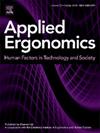编制学前教师工作环境中的人体工程学风险因素(生理和社会心理)调查问卷
IF 3.4
2区 工程技术
Q2 ENGINEERING, INDUSTRIAL
引用次数: 0
摘要
与工作相关的肌肉骨骼疾病(WMSDs)在学前教师和助理(pta)中普遍存在且费用高昂,导致高流动率。本研究旨在编制一份人体工效学自评问卷,以评估PTA工作环境中的生理及心理危险因素。随机选择318名pta完成一份在线调查问卷,内容包括人口统计细节、肌肉骨骼疼痛和职业状况,对与日常工作和社会心理风险因素相关的73项(态度)进行评分。最终完成的《幼儿教师工作环境问卷》(PEQ)包含5个域的46个题项,具有较高的信度(Cronbach's Alpha: 0.814-0.953)和良好的重测稳定性(ICC >0.97)。逻辑回归显示,人体工程学因素(例如,笨拙和静态的姿势,重复的动作,不适当的工具和设备设计)与wmsd之间存在显著关联。PEQ是确定WMSD风险因素的有效工具,强调需要采取干预措施,改善pta的福祉。未来的研究应在以色列和全球不同的学前教师人群中预测WMSD,以确定风险因素并制定有针对性的预防策略。本文章由计算机程序翻译,如有差异,请以英文原文为准。
Development of ergonomic risk factors (physical and psychosocial) questionnaire among preschool teachers' work environment
Work-related musculoskeletal disorders (WMSDs) are prevalent and costly among preschool teachers and assistants (PTAs), contributing to high turnover rates. This study aimed to develop a self-assessment ergonomic questionnaire to evaluate physical and psychosocial risk factors in PTA work environments. A total of 318 PTAs were randomly selected to complete an online questionnaire covering demographic details, musculoskeletal pain, and occupational conditions, rating 73 items (attitudes) related to everyday tasks and psychosocial risk factors. The finalized Preschool Teachers' Work Environment Questionnaire (PEQ) comprised 46 items across five domains, demonstrating high reliability (Cronbach's Alpha: 0.814–0.953) and excellent test-retest stability (ICC >0.97). Logistic regression revealed significant associations between ergonomic factors (e.g., awkward and static postures, repetitive motions, and improper tools and equipment design) and WMSDs. The PEQ is an effective tool for identifying WMSD risk factors, underscoring the need for interventions that improve the well-being of PTAs. Future research should predict WMSD among diverse preschool teachers' populations in Israel and globally to identify risk factors and develop targeted prevention strategies.
求助全文
通过发布文献求助,成功后即可免费获取论文全文。
去求助
来源期刊

Applied Ergonomics
工程技术-工程:工业
CiteScore
7.50
自引率
9.40%
发文量
248
审稿时长
53 days
期刊介绍:
Applied Ergonomics is aimed at ergonomists and all those interested in applying ergonomics/human factors in the design, planning and management of technical and social systems at work or leisure. Readership is truly international with subscribers in over 50 countries. Professionals for whom Applied Ergonomics is of interest include: ergonomists, designers, industrial engineers, health and safety specialists, systems engineers, design engineers, organizational psychologists, occupational health specialists and human-computer interaction specialists.
 求助内容:
求助内容: 应助结果提醒方式:
应助结果提醒方式:


